Business Law Assignment: Contract Law Problem Solutions - Semester 1
VerifiedAdded on 2023/04/21
|8
|1988
|208
Homework Assignment
AI Summary
This document presents solutions to a business law assignment addressing several legal problems. The first problem examines the enforceability of a verbal agreement between a father and son, considering intention and consideration, and promissory estoppel. The second problem focuses on a breach of contract case involving a computer purchase, analyzing the concept of consideration and renegotiation of contracts. The third problem explores an exclusion clause and its impact on liability for loss during transit or storage. The fourth problem examines whether a hotel can be held liable for the loss of a guest's property, considering both express and implied terms of the contract. The final problem investigates whether a party can sue for breach of contract based on implied terms related to custom or trade usage. Each problem includes a rule, case examples, and an answer, providing a comprehensive analysis of the legal issues involved.
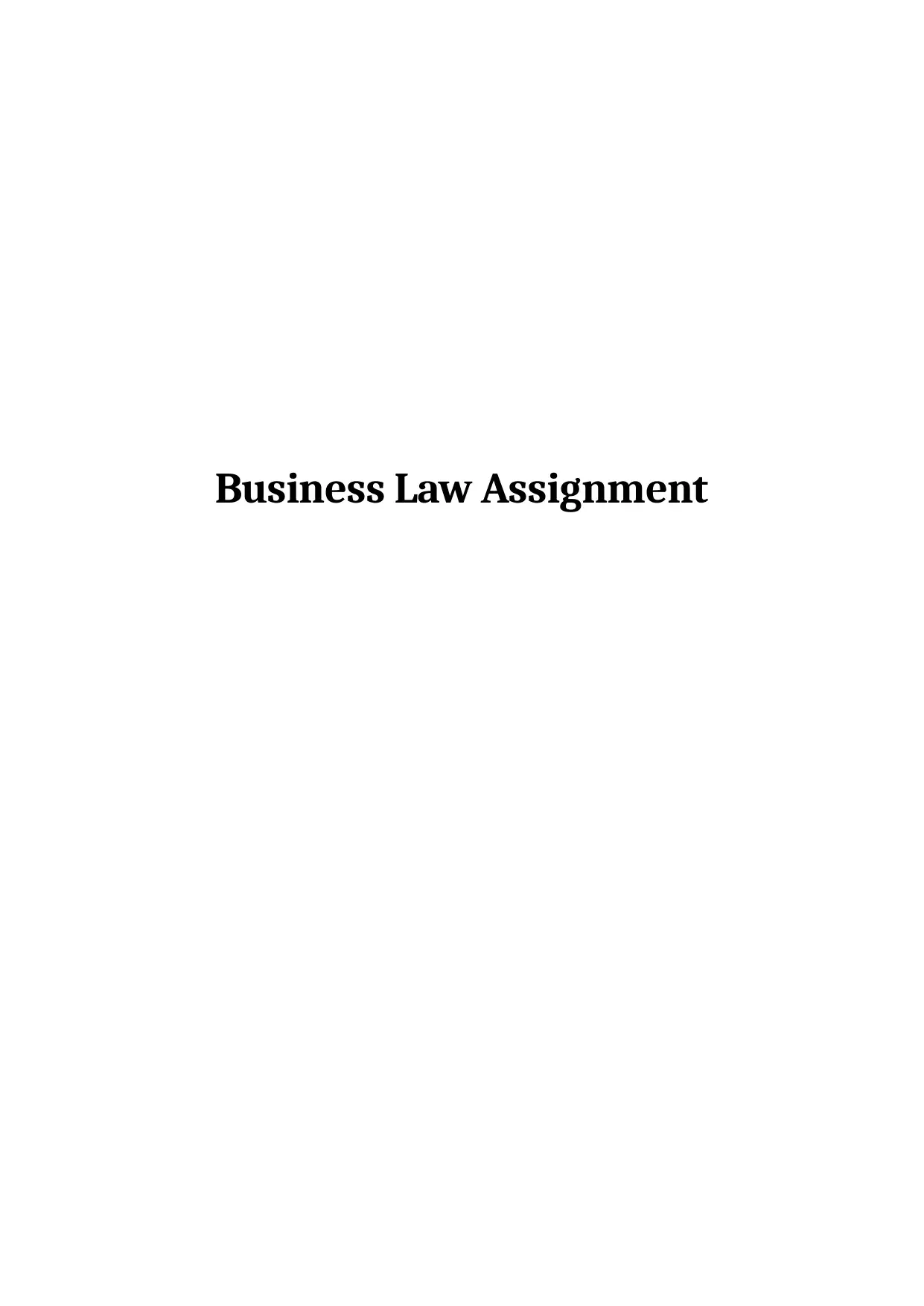
Business Law Assignment
Paraphrase This Document
Need a fresh take? Get an instant paraphrase of this document with our AI Paraphraser
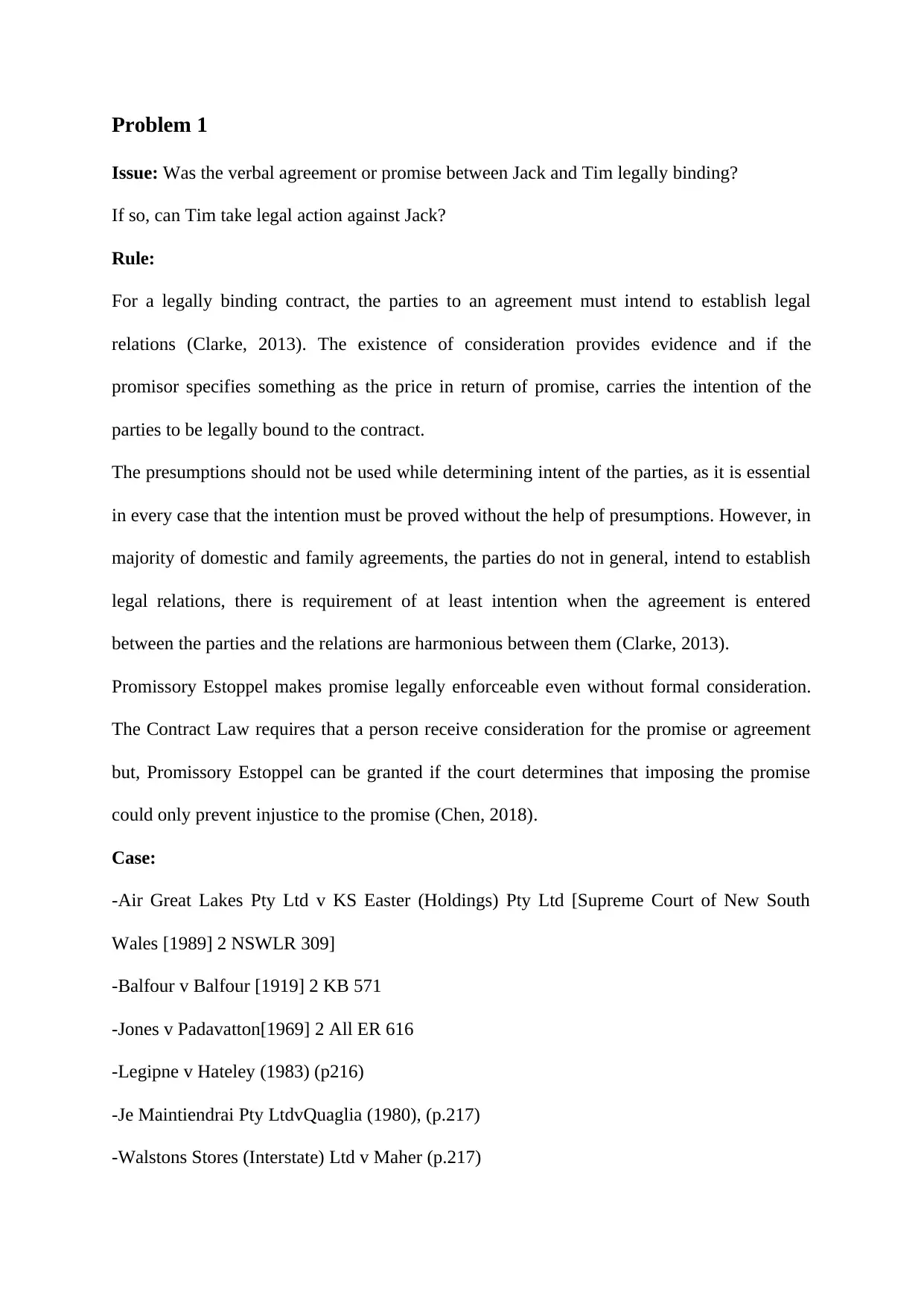
Problem 1
Issue: Was the verbal agreement or promise between Jack and Tim legally binding?
If so, can Tim take legal action against Jack?
Rule:
For a legally binding contract, the parties to an agreement must intend to establish legal
relations (Clarke, 2013). The existence of consideration provides evidence and if the
promisor specifies something as the price in return of promise, carries the intention of the
parties to be legally bound to the contract.
The presumptions should not be used while determining intent of the parties, as it is essential
in every case that the intention must be proved without the help of presumptions. However, in
majority of domestic and family agreements, the parties do not in general, intend to establish
legal relations, there is requirement of at least intention when the agreement is entered
between the parties and the relations are harmonious between them (Clarke, 2013).
Promissory Estoppel makes promise legally enforceable even without formal consideration.
The Contract Law requires that a person receive consideration for the promise or agreement
but, Promissory Estoppel can be granted if the court determines that imposing the promise
could only prevent injustice to the promise (Chen, 2018).
Case:
-Air Great Lakes Pty Ltd v KS Easter (Holdings) Pty Ltd [Supreme Court of New South
Wales [1989] 2 NSWLR 309]
-Balfour v Balfour [1919] 2 KB 571
-Jones v Padavatton[1969] 2 All ER 616
-Legipne v Hateley (1983) (p216)
-Je Maintiendrai Pty LtdvQuaglia (1980), (p.217)
-Walstons Stores (Interstate) Ltd v Maher (p.217)
Issue: Was the verbal agreement or promise between Jack and Tim legally binding?
If so, can Tim take legal action against Jack?
Rule:
For a legally binding contract, the parties to an agreement must intend to establish legal
relations (Clarke, 2013). The existence of consideration provides evidence and if the
promisor specifies something as the price in return of promise, carries the intention of the
parties to be legally bound to the contract.
The presumptions should not be used while determining intent of the parties, as it is essential
in every case that the intention must be proved without the help of presumptions. However, in
majority of domestic and family agreements, the parties do not in general, intend to establish
legal relations, there is requirement of at least intention when the agreement is entered
between the parties and the relations are harmonious between them (Clarke, 2013).
Promissory Estoppel makes promise legally enforceable even without formal consideration.
The Contract Law requires that a person receive consideration for the promise or agreement
but, Promissory Estoppel can be granted if the court determines that imposing the promise
could only prevent injustice to the promise (Chen, 2018).
Case:
-Air Great Lakes Pty Ltd v KS Easter (Holdings) Pty Ltd [Supreme Court of New South
Wales [1989] 2 NSWLR 309]
-Balfour v Balfour [1919] 2 KB 571
-Jones v Padavatton[1969] 2 All ER 616
-Legipne v Hateley (1983) (p216)
-Je Maintiendrai Pty LtdvQuaglia (1980), (p.217)
-Walstons Stores (Interstate) Ltd v Maher (p.217)
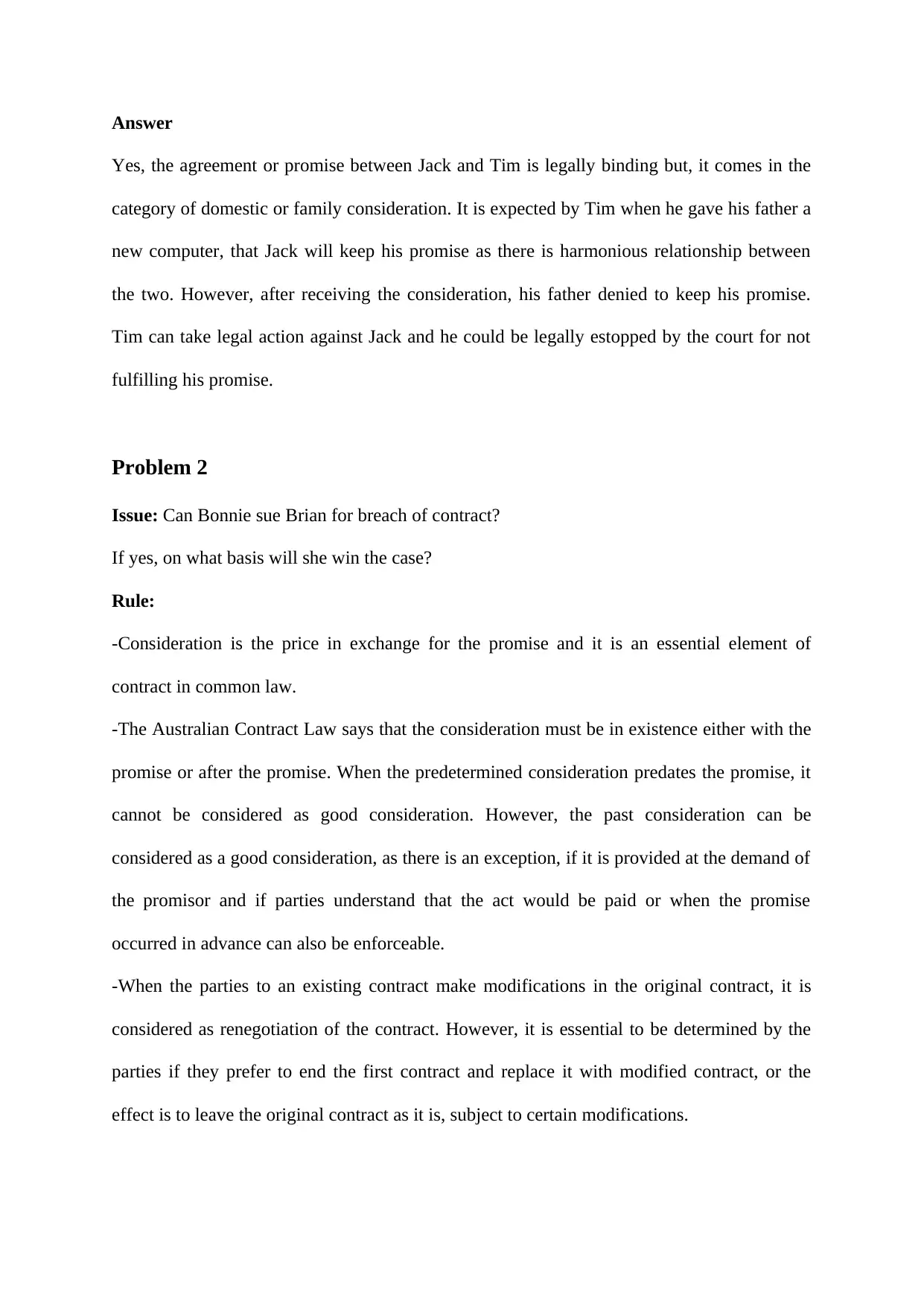
Answer
Yes, the agreement or promise between Jack and Tim is legally binding but, it comes in the
category of domestic or family consideration. It is expected by Tim when he gave his father a
new computer, that Jack will keep his promise as there is harmonious relationship between
the two. However, after receiving the consideration, his father denied to keep his promise.
Tim can take legal action against Jack and he could be legally estopped by the court for not
fulfilling his promise.
Problem 2
Issue: Can Bonnie sue Brian for breach of contract?
If yes, on what basis will she win the case?
Rule:
-Consideration is the price in exchange for the promise and it is an essential element of
contract in common law.
-The Australian Contract Law says that the consideration must be in existence either with the
promise or after the promise. When the predetermined consideration predates the promise, it
cannot be considered as good consideration. However, the past consideration can be
considered as a good consideration, as there is an exception, if it is provided at the demand of
the promisor and if parties understand that the act would be paid or when the promise
occurred in advance can also be enforceable.
-When the parties to an existing contract make modifications in the original contract, it is
considered as renegotiation of the contract. However, it is essential to be determined by the
parties if they prefer to end the first contract and replace it with modified contract, or the
effect is to leave the original contract as it is, subject to certain modifications.
Yes, the agreement or promise between Jack and Tim is legally binding but, it comes in the
category of domestic or family consideration. It is expected by Tim when he gave his father a
new computer, that Jack will keep his promise as there is harmonious relationship between
the two. However, after receiving the consideration, his father denied to keep his promise.
Tim can take legal action against Jack and he could be legally estopped by the court for not
fulfilling his promise.
Problem 2
Issue: Can Bonnie sue Brian for breach of contract?
If yes, on what basis will she win the case?
Rule:
-Consideration is the price in exchange for the promise and it is an essential element of
contract in common law.
-The Australian Contract Law says that the consideration must be in existence either with the
promise or after the promise. When the predetermined consideration predates the promise, it
cannot be considered as good consideration. However, the past consideration can be
considered as a good consideration, as there is an exception, if it is provided at the demand of
the promisor and if parties understand that the act would be paid or when the promise
occurred in advance can also be enforceable.
-When the parties to an existing contract make modifications in the original contract, it is
considered as renegotiation of the contract. However, it is essential to be determined by the
parties if they prefer to end the first contract and replace it with modified contract, or the
effect is to leave the original contract as it is, subject to certain modifications.
⊘ This is a preview!⊘
Do you want full access?
Subscribe today to unlock all pages.

Trusted by 1+ million students worldwide
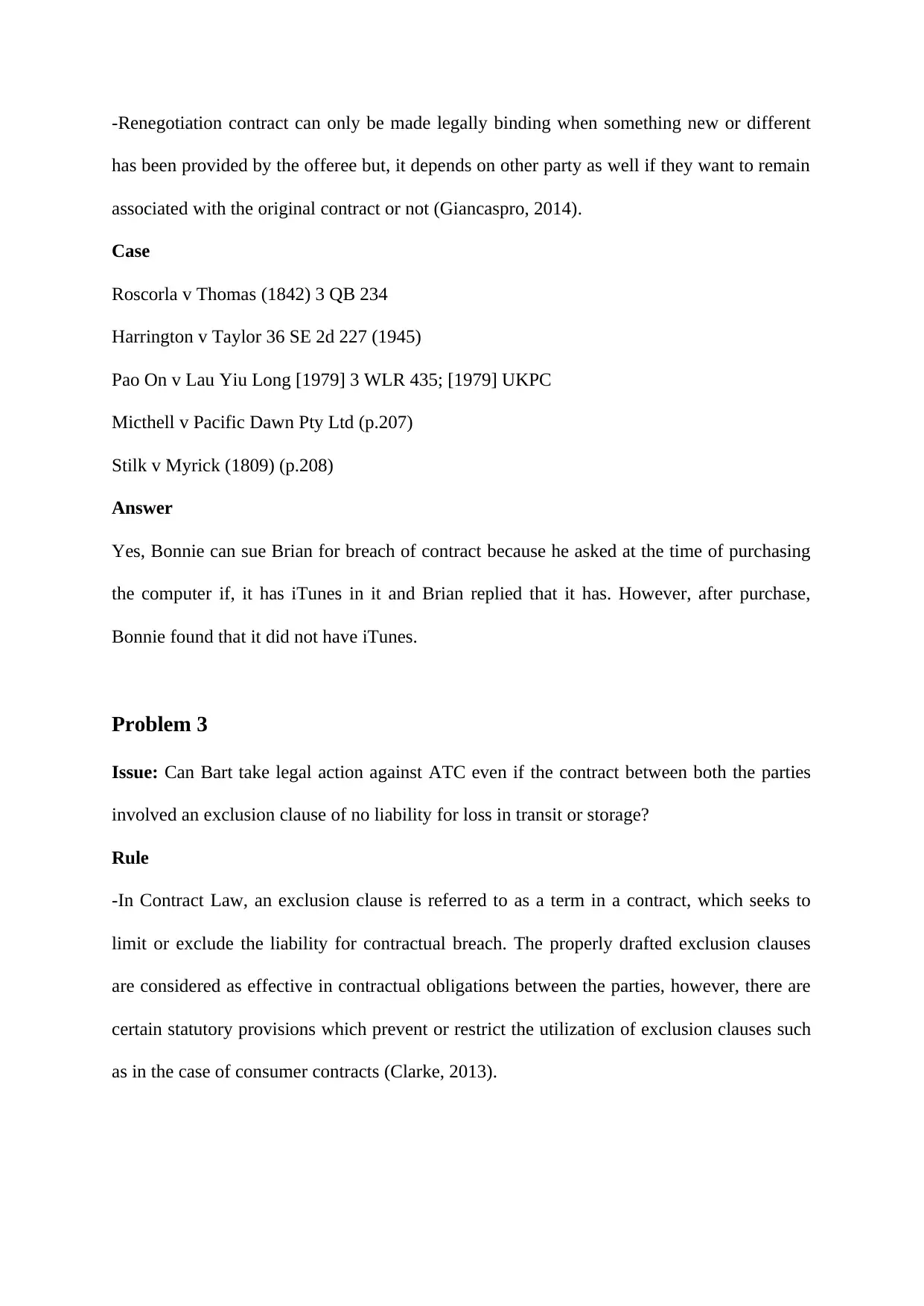
-Renegotiation contract can only be made legally binding when something new or different
has been provided by the offeree but, it depends on other party as well if they want to remain
associated with the original contract or not (Giancaspro, 2014).
Case
Roscorla v Thomas (1842) 3 QB 234
Harrington v Taylor 36 SE 2d 227 (1945)
Pao On v Lau Yiu Long [1979] 3 WLR 435; [1979] UKPC
Micthell v Pacific Dawn Pty Ltd (p.207)
Stilk v Myrick (1809) (p.208)
Answer
Yes, Bonnie can sue Brian for breach of contract because he asked at the time of purchasing
the computer if, it has iTunes in it and Brian replied that it has. However, after purchase,
Bonnie found that it did not have iTunes.
Problem 3
Issue: Can Bart take legal action against ATC even if the contract between both the parties
involved an exclusion clause of no liability for loss in transit or storage?
Rule
-In Contract Law, an exclusion clause is referred to as a term in a contract, which seeks to
limit or exclude the liability for contractual breach. The properly drafted exclusion clauses
are considered as effective in contractual obligations between the parties, however, there are
certain statutory provisions which prevent or restrict the utilization of exclusion clauses such
as in the case of consumer contracts (Clarke, 2013).
has been provided by the offeree but, it depends on other party as well if they want to remain
associated with the original contract or not (Giancaspro, 2014).
Case
Roscorla v Thomas (1842) 3 QB 234
Harrington v Taylor 36 SE 2d 227 (1945)
Pao On v Lau Yiu Long [1979] 3 WLR 435; [1979] UKPC
Micthell v Pacific Dawn Pty Ltd (p.207)
Stilk v Myrick (1809) (p.208)
Answer
Yes, Bonnie can sue Brian for breach of contract because he asked at the time of purchasing
the computer if, it has iTunes in it and Brian replied that it has. However, after purchase,
Bonnie found that it did not have iTunes.
Problem 3
Issue: Can Bart take legal action against ATC even if the contract between both the parties
involved an exclusion clause of no liability for loss in transit or storage?
Rule
-In Contract Law, an exclusion clause is referred to as a term in a contract, which seeks to
limit or exclude the liability for contractual breach. The properly drafted exclusion clauses
are considered as effective in contractual obligations between the parties, however, there are
certain statutory provisions which prevent or restrict the utilization of exclusion clauses such
as in the case of consumer contracts (Clarke, 2013).
Paraphrase This Document
Need a fresh take? Get an instant paraphrase of this document with our AI Paraphraser
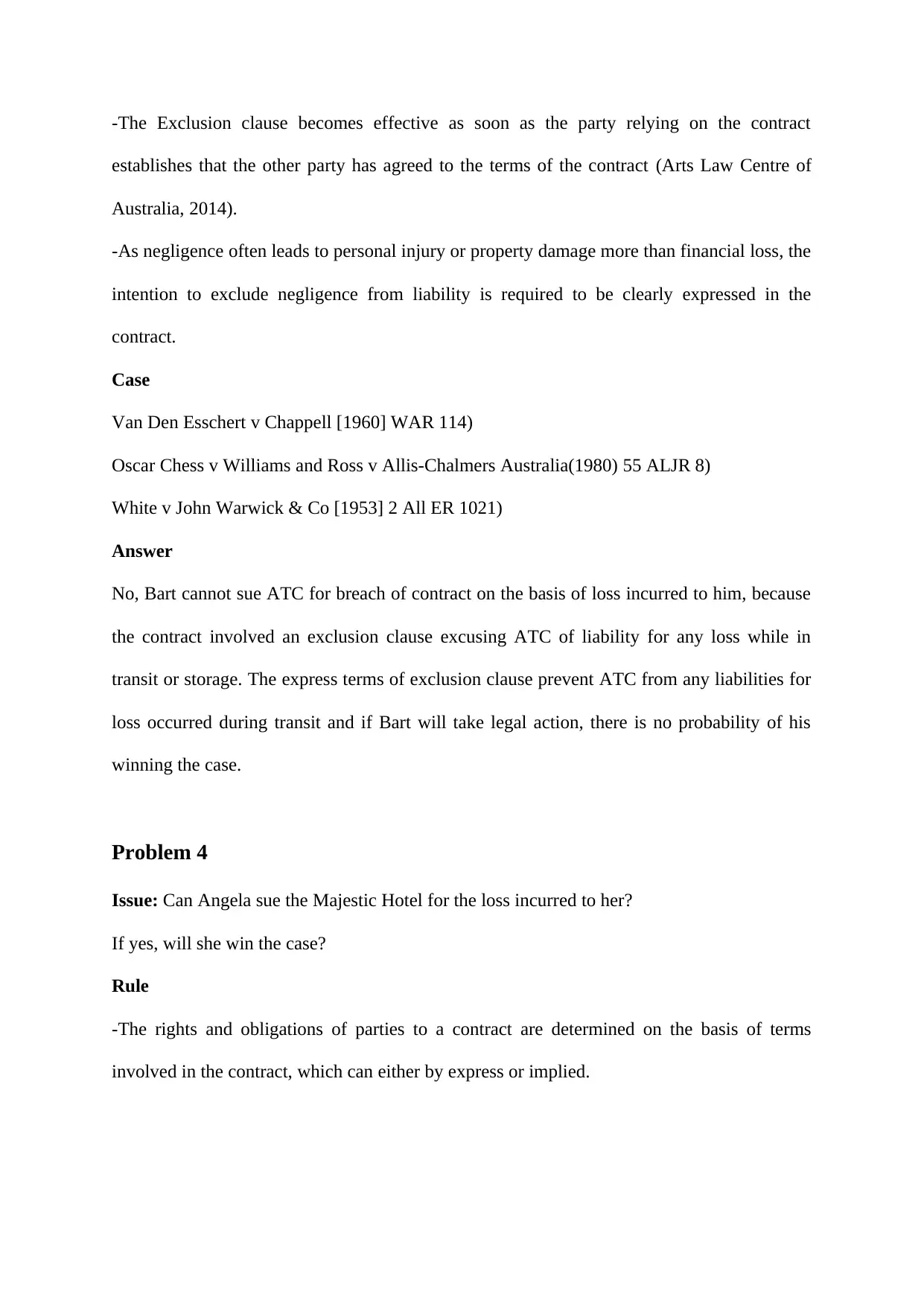
-The Exclusion clause becomes effective as soon as the party relying on the contract
establishes that the other party has agreed to the terms of the contract (Arts Law Centre of
Australia, 2014).
-As negligence often leads to personal injury or property damage more than financial loss, the
intention to exclude negligence from liability is required to be clearly expressed in the
contract.
Case
Van Den Esschert v Chappell [1960] WAR 114)
Oscar Chess v Williams and Ross v Allis-Chalmers Australia(1980) 55 ALJR 8)
White v John Warwick & Co [1953] 2 All ER 1021)
Answer
No, Bart cannot sue ATC for breach of contract on the basis of loss incurred to him, because
the contract involved an exclusion clause excusing ATC of liability for any loss while in
transit or storage. The express terms of exclusion clause prevent ATC from any liabilities for
loss occurred during transit and if Bart will take legal action, there is no probability of his
winning the case.
Problem 4
Issue: Can Angela sue the Majestic Hotel for the loss incurred to her?
If yes, will she win the case?
Rule
-The rights and obligations of parties to a contract are determined on the basis of terms
involved in the contract, which can either by express or implied.
establishes that the other party has agreed to the terms of the contract (Arts Law Centre of
Australia, 2014).
-As negligence often leads to personal injury or property damage more than financial loss, the
intention to exclude negligence from liability is required to be clearly expressed in the
contract.
Case
Van Den Esschert v Chappell [1960] WAR 114)
Oscar Chess v Williams and Ross v Allis-Chalmers Australia(1980) 55 ALJR 8)
White v John Warwick & Co [1953] 2 All ER 1021)
Answer
No, Bart cannot sue ATC for breach of contract on the basis of loss incurred to him, because
the contract involved an exclusion clause excusing ATC of liability for any loss while in
transit or storage. The express terms of exclusion clause prevent ATC from any liabilities for
loss occurred during transit and if Bart will take legal action, there is no probability of his
winning the case.
Problem 4
Issue: Can Angela sue the Majestic Hotel for the loss incurred to her?
If yes, will she win the case?
Rule
-The rights and obligations of parties to a contract are determined on the basis of terms
involved in the contract, which can either by express or implied.
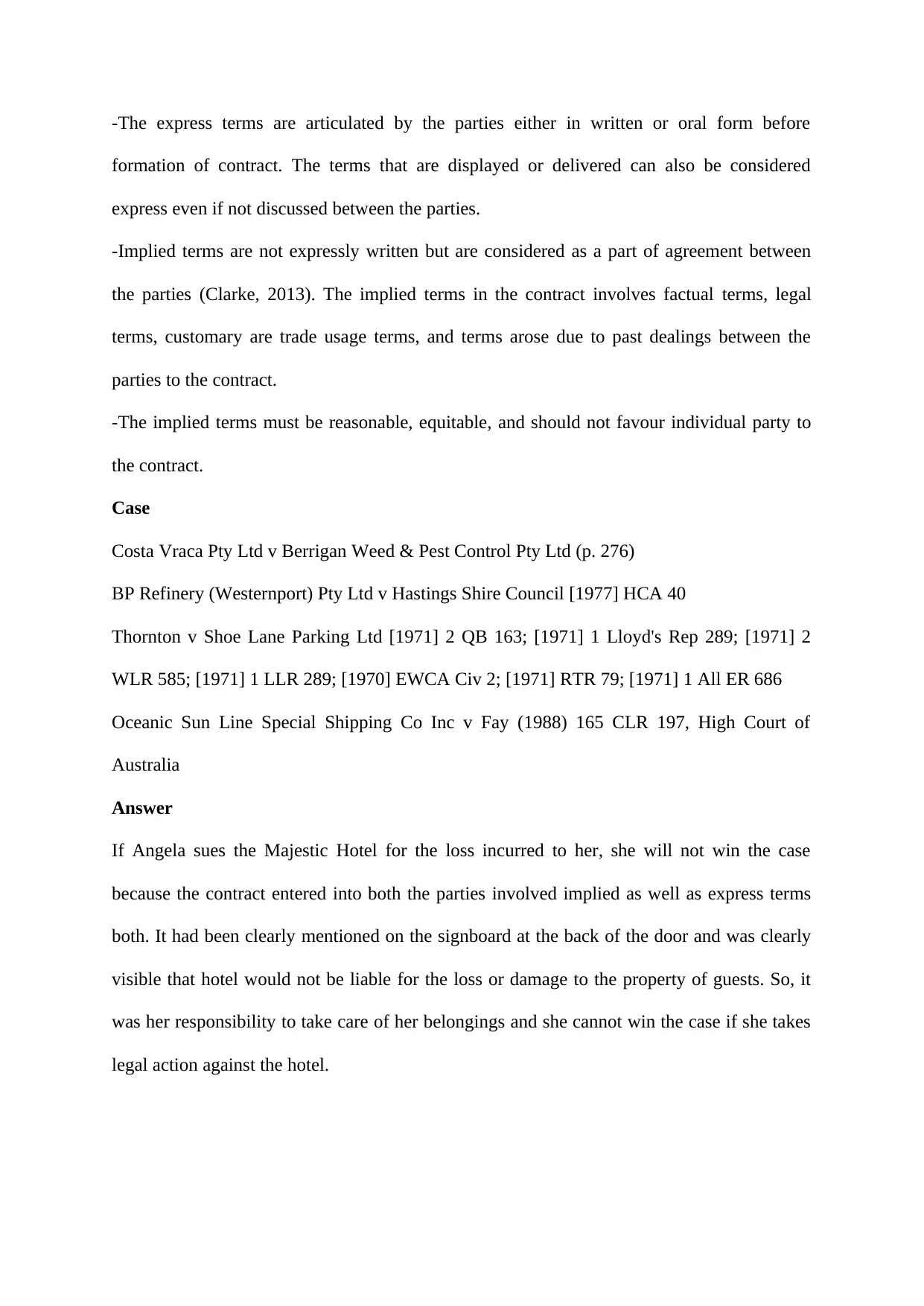
-The express terms are articulated by the parties either in written or oral form before
formation of contract. The terms that are displayed or delivered can also be considered
express even if not discussed between the parties.
-Implied terms are not expressly written but are considered as a part of agreement between
the parties (Clarke, 2013). The implied terms in the contract involves factual terms, legal
terms, customary are trade usage terms, and terms arose due to past dealings between the
parties to the contract.
-The implied terms must be reasonable, equitable, and should not favour individual party to
the contract.
Case
Costa Vraca Pty Ltd v Berrigan Weed & Pest Control Pty Ltd (p. 276)
BP Refinery (Westernport) Pty Ltd v Hastings Shire Council [1977] HCA 40
Thornton v Shoe Lane Parking Ltd [1971] 2 QB 163; [1971] 1 Lloyd's Rep 289; [1971] 2
WLR 585; [1971] 1 LLR 289; [1970] EWCA Civ 2; [1971] RTR 79; [1971] 1 All ER 686
Oceanic Sun Line Special Shipping Co Inc v Fay (1988) 165 CLR 197, High Court of
Australia
Answer
If Angela sues the Majestic Hotel for the loss incurred to her, she will not win the case
because the contract entered into both the parties involved implied as well as express terms
both. It had been clearly mentioned on the signboard at the back of the door and was clearly
visible that hotel would not be liable for the loss or damage to the property of guests. So, it
was her responsibility to take care of her belongings and she cannot win the case if she takes
legal action against the hotel.
formation of contract. The terms that are displayed or delivered can also be considered
express even if not discussed between the parties.
-Implied terms are not expressly written but are considered as a part of agreement between
the parties (Clarke, 2013). The implied terms in the contract involves factual terms, legal
terms, customary are trade usage terms, and terms arose due to past dealings between the
parties to the contract.
-The implied terms must be reasonable, equitable, and should not favour individual party to
the contract.
Case
Costa Vraca Pty Ltd v Berrigan Weed & Pest Control Pty Ltd (p. 276)
BP Refinery (Westernport) Pty Ltd v Hastings Shire Council [1977] HCA 40
Thornton v Shoe Lane Parking Ltd [1971] 2 QB 163; [1971] 1 Lloyd's Rep 289; [1971] 2
WLR 585; [1971] 1 LLR 289; [1970] EWCA Civ 2; [1971] RTR 79; [1971] 1 All ER 686
Oceanic Sun Line Special Shipping Co Inc v Fay (1988) 165 CLR 197, High Court of
Australia
Answer
If Angela sues the Majestic Hotel for the loss incurred to her, she will not win the case
because the contract entered into both the parties involved implied as well as express terms
both. It had been clearly mentioned on the signboard at the back of the door and was clearly
visible that hotel would not be liable for the loss or damage to the property of guests. So, it
was her responsibility to take care of her belongings and she cannot win the case if she takes
legal action against the hotel.
⊘ This is a preview!⊘
Do you want full access?
Subscribe today to unlock all pages.

Trusted by 1+ million students worldwide
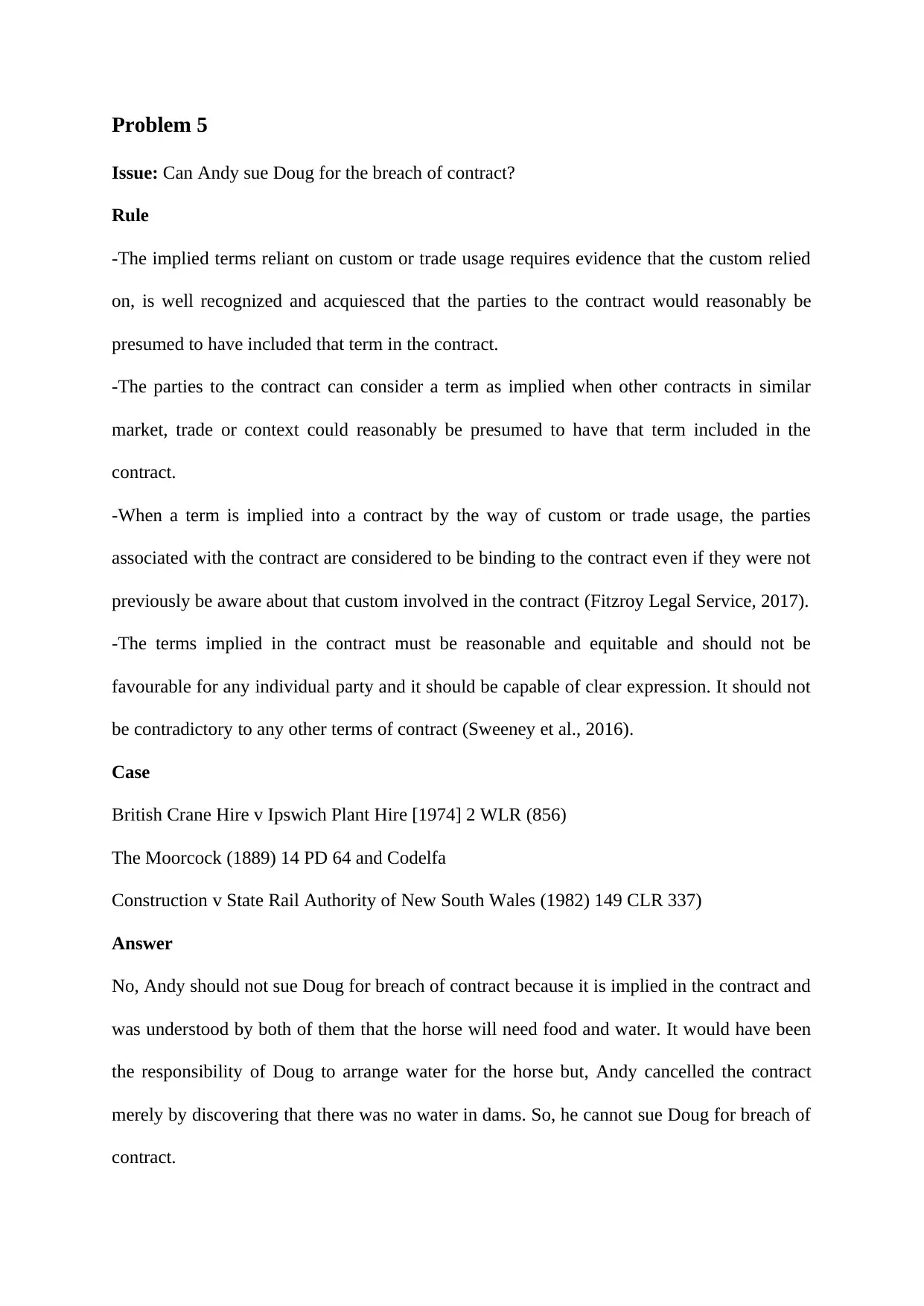
Problem 5
Issue: Can Andy sue Doug for the breach of contract?
Rule
-The implied terms reliant on custom or trade usage requires evidence that the custom relied
on, is well recognized and acquiesced that the parties to the contract would reasonably be
presumed to have included that term in the contract.
-The parties to the contract can consider a term as implied when other contracts in similar
market, trade or context could reasonably be presumed to have that term included in the
contract.
-When a term is implied into a contract by the way of custom or trade usage, the parties
associated with the contract are considered to be binding to the contract even if they were not
previously be aware about that custom involved in the contract (Fitzroy Legal Service, 2017).
-The terms implied in the contract must be reasonable and equitable and should not be
favourable for any individual party and it should be capable of clear expression. It should not
be contradictory to any other terms of contract (Sweeney et al., 2016).
Case
British Crane Hire v Ipswich Plant Hire [1974] 2 WLR (856)
The Moorcock (1889) 14 PD 64 and Codelfa
Construction v State Rail Authority of New South Wales (1982) 149 CLR 337)
Answer
No, Andy should not sue Doug for breach of contract because it is implied in the contract and
was understood by both of them that the horse will need food and water. It would have been
the responsibility of Doug to arrange water for the horse but, Andy cancelled the contract
merely by discovering that there was no water in dams. So, he cannot sue Doug for breach of
contract.
Issue: Can Andy sue Doug for the breach of contract?
Rule
-The implied terms reliant on custom or trade usage requires evidence that the custom relied
on, is well recognized and acquiesced that the parties to the contract would reasonably be
presumed to have included that term in the contract.
-The parties to the contract can consider a term as implied when other contracts in similar
market, trade or context could reasonably be presumed to have that term included in the
contract.
-When a term is implied into a contract by the way of custom or trade usage, the parties
associated with the contract are considered to be binding to the contract even if they were not
previously be aware about that custom involved in the contract (Fitzroy Legal Service, 2017).
-The terms implied in the contract must be reasonable and equitable and should not be
favourable for any individual party and it should be capable of clear expression. It should not
be contradictory to any other terms of contract (Sweeney et al., 2016).
Case
British Crane Hire v Ipswich Plant Hire [1974] 2 WLR (856)
The Moorcock (1889) 14 PD 64 and Codelfa
Construction v State Rail Authority of New South Wales (1982) 149 CLR 337)
Answer
No, Andy should not sue Doug for breach of contract because it is implied in the contract and
was understood by both of them that the horse will need food and water. It would have been
the responsibility of Doug to arrange water for the horse but, Andy cancelled the contract
merely by discovering that there was no water in dams. So, he cannot sue Doug for breach of
contract.
Paraphrase This Document
Need a fresh take? Get an instant paraphrase of this document with our AI Paraphraser
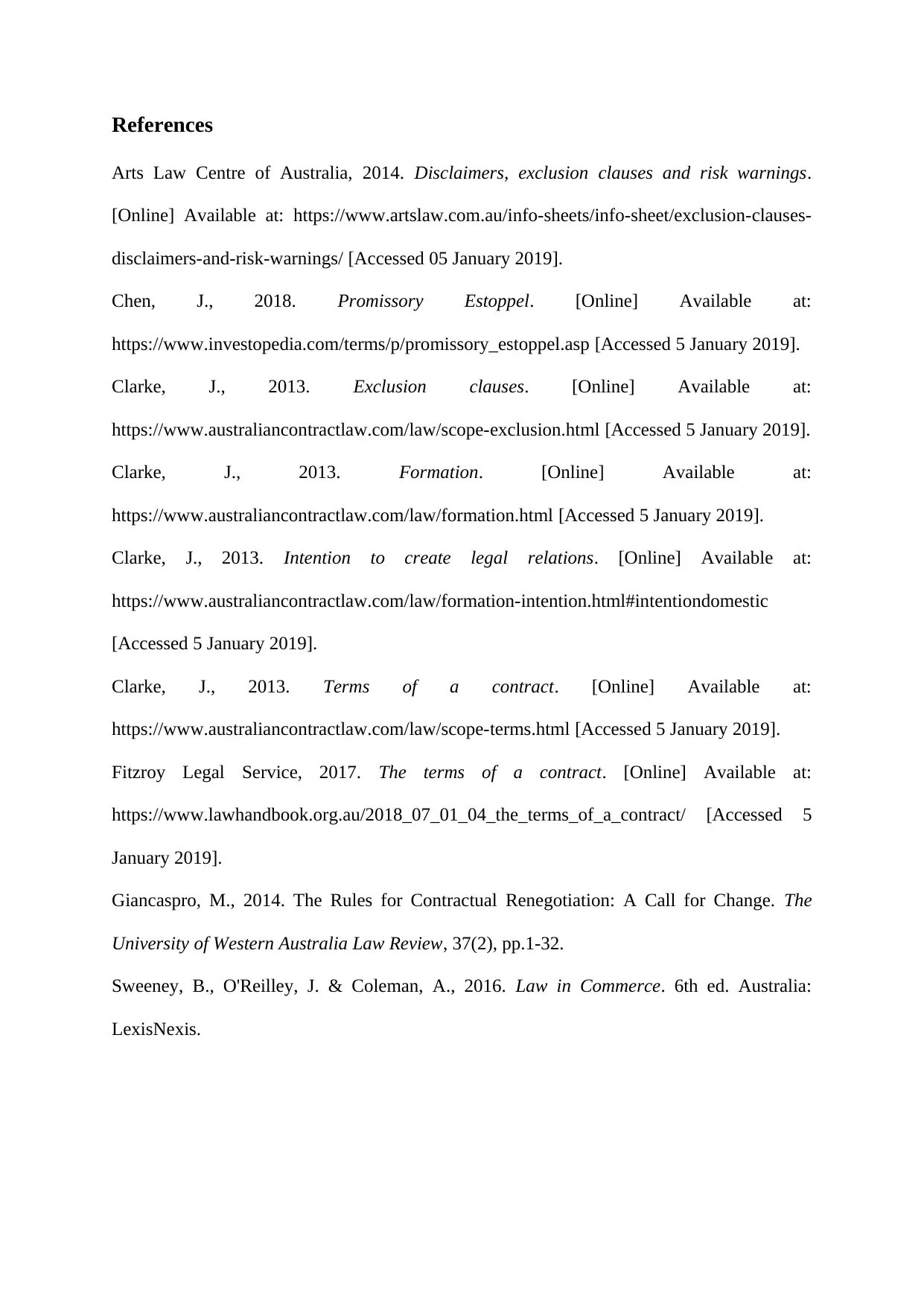
References
Arts Law Centre of Australia, 2014. Disclaimers, exclusion clauses and risk warnings.
[Online] Available at: https://www.artslaw.com.au/info-sheets/info-sheet/exclusion-clauses-
disclaimers-and-risk-warnings/ [Accessed 05 January 2019].
Chen, J., 2018. Promissory Estoppel. [Online] Available at:
https://www.investopedia.com/terms/p/promissory_estoppel.asp [Accessed 5 January 2019].
Clarke, J., 2013. Exclusion clauses. [Online] Available at:
https://www.australiancontractlaw.com/law/scope-exclusion.html [Accessed 5 January 2019].
Clarke, J., 2013. Formation. [Online] Available at:
https://www.australiancontractlaw.com/law/formation.html [Accessed 5 January 2019].
Clarke, J., 2013. Intention to create legal relations. [Online] Available at:
https://www.australiancontractlaw.com/law/formation-intention.html#intentiondomestic
[Accessed 5 January 2019].
Clarke, J., 2013. Terms of a contract. [Online] Available at:
https://www.australiancontractlaw.com/law/scope-terms.html [Accessed 5 January 2019].
Fitzroy Legal Service, 2017. The terms of a contract. [Online] Available at:
https://www.lawhandbook.org.au/2018_07_01_04_the_terms_of_a_contract/ [Accessed 5
January 2019].
Giancaspro, M., 2014. The Rules for Contractual Renegotiation: A Call for Change. The
University of Western Australia Law Review, 37(2), pp.1-32.
Sweeney, B., O'Reilley, J. & Coleman, A., 2016. Law in Commerce. 6th ed. Australia:
LexisNexis.
Arts Law Centre of Australia, 2014. Disclaimers, exclusion clauses and risk warnings.
[Online] Available at: https://www.artslaw.com.au/info-sheets/info-sheet/exclusion-clauses-
disclaimers-and-risk-warnings/ [Accessed 05 January 2019].
Chen, J., 2018. Promissory Estoppel. [Online] Available at:
https://www.investopedia.com/terms/p/promissory_estoppel.asp [Accessed 5 January 2019].
Clarke, J., 2013. Exclusion clauses. [Online] Available at:
https://www.australiancontractlaw.com/law/scope-exclusion.html [Accessed 5 January 2019].
Clarke, J., 2013. Formation. [Online] Available at:
https://www.australiancontractlaw.com/law/formation.html [Accessed 5 January 2019].
Clarke, J., 2013. Intention to create legal relations. [Online] Available at:
https://www.australiancontractlaw.com/law/formation-intention.html#intentiondomestic
[Accessed 5 January 2019].
Clarke, J., 2013. Terms of a contract. [Online] Available at:
https://www.australiancontractlaw.com/law/scope-terms.html [Accessed 5 January 2019].
Fitzroy Legal Service, 2017. The terms of a contract. [Online] Available at:
https://www.lawhandbook.org.au/2018_07_01_04_the_terms_of_a_contract/ [Accessed 5
January 2019].
Giancaspro, M., 2014. The Rules for Contractual Renegotiation: A Call for Change. The
University of Western Australia Law Review, 37(2), pp.1-32.
Sweeney, B., O'Reilley, J. & Coleman, A., 2016. Law in Commerce. 6th ed. Australia:
LexisNexis.
1 out of 8
Related Documents
Your All-in-One AI-Powered Toolkit for Academic Success.
+13062052269
info@desklib.com
Available 24*7 on WhatsApp / Email
![[object Object]](/_next/static/media/star-bottom.7253800d.svg)
Unlock your academic potential
Copyright © 2020–2026 A2Z Services. All Rights Reserved. Developed and managed by ZUCOL.

